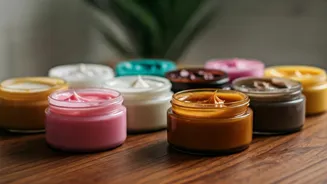Hydration Deep Dive
Dry and damaged hair requires a targeted approach to revive its inherent health, and hydration is the foremost step. The first category of hair masks focuses
on delivering intense hydration. These masks often contain ingredients like hyaluronic acid, which attracts and retains moisture. Also, masks enriched with aloe vera and honey can soothe the scalp and add moisture to the hair shafts. Look for masks that provide a blend of humectants and emollients to trap moisture within the hair strands. These masks can transform the look and feel of your hair, making it smoother, softer, and less prone to breakage. Consistent use, as per product instructions, is important for achieving optimal results, which includes a noticeable improvement in the hair’s texture and manageability.
Argan Oil's Magic
Argan oil is a prized ingredient in many hair masks, and for good reason. This oil, rich in fatty acids and vitamin E, provides excellent moisturizing and conditioning properties. When incorporated into a hair mask, argan oil can deeply penetrate the hair shaft, nourishing it from within. Regular application of argan oil-based masks can help repair split ends, reduce frizz, and boost shine. Consider masks that combine argan oil with other beneficial components like keratin or shea butter for enhanced repair. Argan oil's lightweight nature ensures that it doesn't weigh down the hair, making it perfect for various hair types. Make sure the product is authentic to benefit from its properties.
Shea Butter's Power
Shea butter is a rich emollient that serves as a key ingredient in numerous hair masks. It offers profound moisturizing benefits, making it ideal for parched and damaged hair. The unique fatty acid composition of shea butter helps seal in moisture, protecting hair from environmental stressors. Moreover, shea butter can help improve the elasticity of the hair, reducing breakage and split ends. For the best results, look for masks containing pure shea butter, as this will provide the most concentrated benefits. Shea butter hair masks offer a luxurious treatment that leaves hair feeling soft, smooth, and thoroughly revitalized, providing a protective layer that keeps hair healthier and more resilient over time.
Coconut Oil's Strength
Coconut oil has become a staple in many hair care routines, offering multiple benefits when incorporated into hair masks. It readily penetrates the hair shaft and provides a deep conditioning effect, reducing protein loss and strengthening the hair structure. Coconut oil is especially beneficial for preventing split ends and promoting overall hair health. When choosing a coconut oil hair mask, ensure the formula includes a high concentration of coconut oil and is free from harsh chemicals. Using it regularly can lead to improved hair manageability, reduced frizz, and a visible increase in hair shine. The inherent properties of coconut oil make it an excellent option for both deep conditioning and long-term hair health maintenance, as it reinforces each hair strand.
Keratin for Repair
Keratin is a protein that forms the building block of hair, and keratin-infused hair masks are designed to repair and strengthen damaged hair. These masks work by filling in gaps in the hair shaft caused by heat styling, chemical treatments, or environmental damage. Regular use of a keratin mask can restore the hair's natural structure, making it smoother, stronger, and more resistant to breakage. Keratin masks also help reduce frizz and improve manageability, resulting in a healthier appearance. The process usually includes applying the mask to clean, damp hair, letting it sit for a period determined by the product's directions, and then thoroughly rinsing. These masks can be integrated into any hair care routine, contributing to significant improvements in hair strength and overall health.
Avocado's Nourishment
Avocado, a nutrient-rich fruit, is an excellent ingredient for hair masks, delivering essential vitamins, minerals, and fatty acids that are beneficial for hair health. The oil from the avocado deeply moisturizes dry and damaged hair, while the vitamins promote overall hair strength. Avocado hair masks help repair damaged hair, increase shine, and improve hair manageability. Homemade avocado masks can be very effective, but it's also possible to find pre-formulated masks that include avocado extract. Applying the mask regularly to damp hair and leaving it on for a specified amount of time allows the nutrients to penetrate and nourish the hair shaft, leading to visibly healthier hair. Avocado hair masks work by enveloping the hair in nutrients that can lead to noticeable changes.
Honey's Sweet Relief
Honey acts as a natural humectant, which means it draws moisture from the air and seals it into the hair, providing excellent hydration. It also has natural antibacterial and anti-inflammatory properties, which can soothe the scalp. Masks containing honey often result in softer, shinier, and more manageable hair. For those dealing with dry and damaged hair, honey hair masks can replenish moisture levels and restore the hair’s natural sheen. Honey is frequently combined with other moisturizing ingredients such as olive oil or coconut oil to create a powerhouse of moisture and nourishment. Using honey hair masks regularly can transform the texture and health of your hair, ensuring it remains hydrated and well-protected against environmental stressors.
Aloe Vera's Calm
Aloe vera is well-regarded for its soothing and healing properties, making it an essential ingredient in hair masks, particularly for those with dry and damaged hair. It contains enzymes, vitamins, and minerals that nourish the scalp and hair, promoting overall hair health. Aloe vera helps hydrate the hair, making it less prone to breakage and split ends. It also calms an irritated scalp, reducing itchiness and flakiness. Aloe vera hair masks often provide a cooling and refreshing sensation. Incorporating aloe vera masks into a regular hair care routine can lead to improved hair health and enhanced manageability, adding a soothing element to your hair care process.
Protein Treatments
Protein treatments work by rebuilding the hair's structure, reinforcing strands weakened by chemical treatments, heat styling, or environmental stressors. The hair comprises protein, so these treatments are designed to replace what is lost. These masks usually contain hydrolyzed proteins, which penetrate the hair shaft and strengthen it from within. For dry and damaged hair, protein masks can help restore elasticity, reduce breakage, and make hair more resilient. It’s important to balance protein treatments with moisturizing ones, as excessive protein can make hair brittle. Using protein masks according to package instructions will help to maintain the structural integrity of your hair, making it appear and feel healthier, stronger, and more vibrant.
DIY Mask Options
Making your own hair masks is a budget-friendly and customizable approach, providing a way to control exactly what goes into your hair care routine. Common ingredients include avocado, honey, olive oil, and yogurt. For dry hair, combining avocado with honey and olive oil creates a deeply hydrating and nourishing mask. A mixture of yogurt and honey can also soothe the scalp while moisturizing. For damage repair, you could include protein-rich ingredients like eggs or yogurt. Experimenting with different combinations allows you to tailor the mask to your specific hair needs. Always ensure the ingredients are fresh and properly mixed for the best results. These DIY hair masks can be a rewarding and cost-effective way to treat dry and damaged hair, allowing you to enjoy healthy, beautiful hair.















